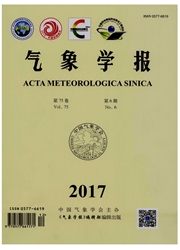

 中文摘要:
中文摘要:
利用热带测雨卫星测雨雷达的10年探测结果,对夏季亚洲对流降水与层云降水雨顶高度分布、雨顶高度与地表降水强度的关系、雨顶高度日变化特征进行了研究。结果表明,青藏高原和中国东部平原的多数(70%以上)对流降水雨顶高度分布在8—12和5—10km,其他地区分布在5~9km;陆面对流降水雨顶平均高度高于洋面。洋面和陆面层云降水雨顶高度没有明显差异,多在5~8km。夏季亚洲浅对流降水比例少,而深厚对流主要出现在中国东部平原、西南、印度次大陆西部至伊朗高原东部地区,比例约40%。洋面和陆面的弱对流降水的雨顶平均高度在7—8km,弱层云降水相应的雨顶平均高度多小于7.5km;陆面约90%的强对流降水雨顶平均高度在9km以上,而强层云降水雨顶的平均高度通常不超过8.5km。夏季亚洲对流降水和层云降水的雨顶平均高度均随着地面平均降水率的增大而升高,两者遵从二次函数关系。对流降水及层云降水频次、强度和雨顶高度的日变化峰值分析表明,陆面这些参量的日变化强于洋面,并且三者的日变化基本同步。
 英文摘要:
英文摘要:
Characteristics of the storm top altitude including its diurnal variations for the convective and stratiform precipitation and its relationship with surface rain rate in summer Asia are investigated based on measurements of the TRMM Precipitation Radar in the latest ten years from 1998 to 2007. The results indicate that more than 70% of convective storm top ranges from 8 to 12 km and from 5 to 10 km over the Tibetan Plateau and the eastern plain of the mainland, respectively. In other regions, the convective storm top is between 5 and 9 km. Generally, the mean altitude of convective storm top is higher over land than that over ocean. For stratiform precipitation, most of its storm top altitude varies from 5 to 8 km no matter over land or over o- cean. Furthermore, the results also show a small percentage of shallow convective precipitation occurring in summer Asia but more than 40% of deep convective precipitation appearing in the eastern plain of the mainland, Southwest China, and the area from the western Indian subcontinent to the eastern Iran Plateau. The statistics shows that the storm top for weak convective precipitation has the mean altitude of about 7 - 8 km while that for weak stratiform precipitation has mostly the mean altitude less than 7.5 km over both land and ocean. On the other hand, about 90% of the heavy convective precipitation tops over land are higher than 9 km while the most heavy stratiform precipitation tops are less than 8.5 km. Additionally, the mean altitudes of both the convective and stratiform storm top in summer Asia increase with the increment of mean surface rain rate, which fits the approached curve of quadratic function. The analyses also show that the distributions of the diurnal peak for the frequency, intensity and storm top of both convective and stratiform precipitation suggest a consistent variation trend in summer Asia but with quite stronger diurnal fluctuation over land than over ocean.
 同期刊论文项目
同期刊论文项目
 同项目期刊论文
同项目期刊论文
 Retrieving latent heating vertical structure from cloud and precipitation profiles-Part II: Deep con
Retrieving latent heating vertical structure from cloud and precipitation profiles-Part II: Deep con 期刊信息
期刊信息
